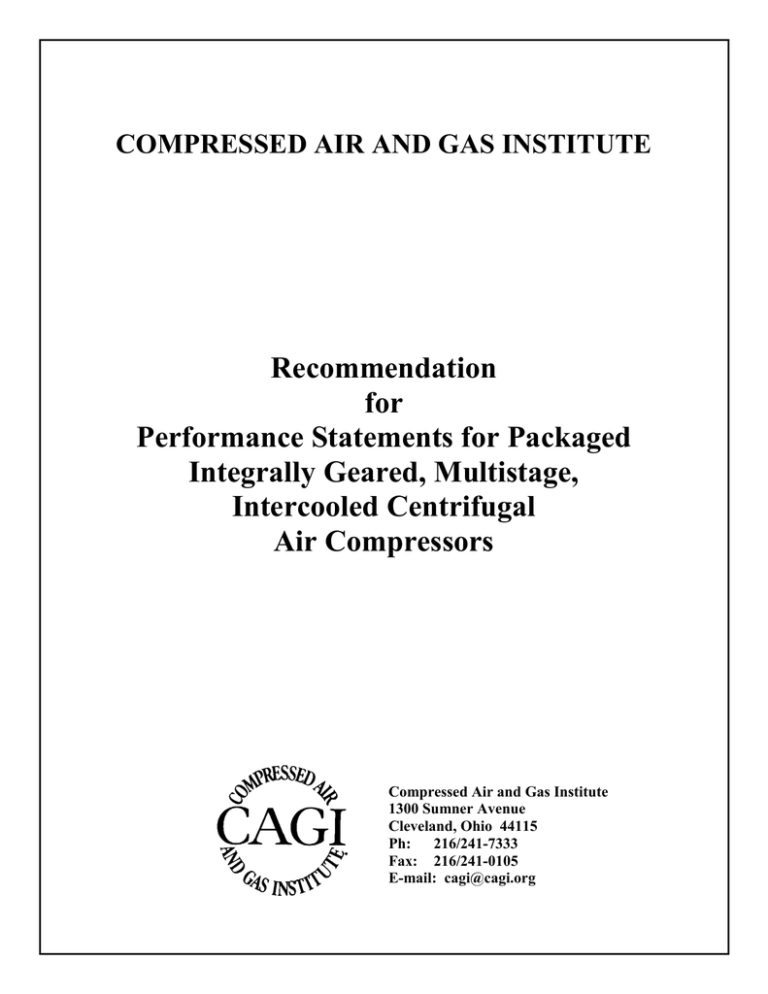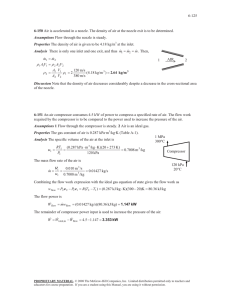Recommendation for Performance Statements for Packaged
advertisement

COMPRESSED AIR AND GAS INSTITUTE Recommendation for Performance Statements for Packaged Integrally Geared, Multistage, Intercooled Centrifugal Air Compressors Compressed Air and Gas Institute 1300 Sumner Avenue Cleveland, Ohio 44115 Ph: 216/241-7333 Fax: 216/241-0105 E-mail: cagi@cagi.org Recommendation for Performance Statements for Packaged Integrally Geared, Multistage, Intercooled Centrifugal Air Compressors SCFM is an abbreviation for capacity in standard cubic feet per minute referenced to air at standard sea level conditions of 14.7 psia (1.013 bar), 60ºF (15.55ºC) and dry. 1. General ASME Power Test Code, PTC-10-1965, reaffirmed 1973, provides procedures and instructions for testing internally cooled compressors provided the test conditions are equivalent (i.e. Class I test) to specified operating conditions. Establishing specified operating conditions on test may be beyond the capability of the compressor manufacturer’s test stand, where extreme inlet temperatures or pressures are specified by the user. Further, experience has shown that it is extremely difficult to verify compressor performance in the field, after the compressor is installed. The information contained herein is provided with the intent of identifying test methods and parameters associated specifically with performance evaluation of fully assembled packaged centrifugal air compressors. ACFM is an abbreviation for capacity in actual cubic feet per minute referenced to ambient air conditions of temperature, pressure and humidity. ICFM is an abbreviation for capacity in inlet cubic feet per minute specifically referenced to air conditions of temperature, pressure and humidity prevailing at the compressor inlet flange. 2.6 Discharge pressure is the total pressure existing at the compressor discharge flange. 2.7 Brake horsepower is the horsepower required at the compressor input shaft. 2.8 Compressor stage is the combination of inlet section, impeller, diffuser section and discharge volute. 2.9 Intercooler is a heat transfer device located between compressor stages and provided with a continuous flow of coolant for the purpose of reducing the air temperature entering the successive stage. 2. Definitions 2.1 A packaged integrally geared, intercooled centrifugal air compressor is a compressor unit designed and manufactured specifically for air handling service. The unit is typically supplied by the manufacturer with integral coolers, lubrication system and compressor controls. Appurtenances may include, but not be limited to prime mover, inlet filter, moisture separators, electrical controls, aftercoolers and sound enclosure. 2.2 Rated performance conditions are established by the manufacturer defining the performance of a particular compressor model. 2.3 Specified performance conditions are established by the purchaser defining the required performance for a particular application. 2.4 Reference performance conditions sometimes referred to as “off-design” are for information purposes only. 2.5 Volume flow rate (capacity) is the volume rate of flow of air as determined at the specified air conditions of temperature, pressure, and humidity. 3. Performance Statements 3.1 The manufacturer shall provide a detailed list of equipment to be furnished within the packaged unit. 3.2 Manufacturer’s ratings are published by the manufacturer for the purpose of defining compressor performance based on specific inlet conditions, etc. Although the conditions assumed may differ from those assumed by another manufacturer, basic thermodynamic relationships, such as those contained in ASME-PTC-10 may be used to convert the manufacturer’s rated performance to compressor performance based on different inlet conditions. The manufacturer shall state rated performance and / or performance at purchaser’s specified conditions. The stated performance shall account for the total package, i.e. include effect of volume flow rate and power ∗ consumption of all primary and auxiliary components contained within the package. 3.3 Performance statements shall following data as a minimum: include manufacturer and purchaser prior to conducting the actual test. Additionally, some manufacturers are equipped to test with or without the customer’s driver, depending on the conditions of sale. the ICFM Discharge Pressure, psig / psia Brake Horsepower Inlet Pressure, * psia Inlet Temperature, * ºF Relative Humidity, % Coolant Flow Rate, gpm Coolant Inlet Temperature, ºF 5.2 Controlled inlet test method requires conditioning the air and coolant supplied to the test compressor thereby duplicating the inlet conditions as specified by the purchaser. 5.3 Corrected speed test method evaluates actual shop test compressor stage data against a computer model by correcting speed in order to compensate for compressor inlet conditions. 5.4 Corrected performance test method evaluates actual shop test compressor stage performance in order to establish compressor stage performance curves. These curves in turn are utilized as a basis for determining compressor operation at the customer’s specified conditions. 5.5 Mechanical run test method provides a means of verifying compressor mechanical performance. 4. Reference Data The following values are suggested as a basis for performance statements: Barometric Pressure: 14.7 psia (1 bar) Relative Humidity: 60% Air Inlet Temperature: 95ºF (35ºC) Coolant Inlet Temperature: 85ºF (29.44ºC) 5. Performance Test Methods 5.1 General requirements. Compressor test methods vary among manufacturers depending on prevailing atmospheric conditions and available facilities, etc. Several of these acceptable test methods are described below. Regardless of the method employed by the manufacturer, the scope of the performance test should be mutually understood and agreed upon by both the 6. Acceptable Performance 6.1 When a performance test is required, the test will be conducted within the manufacturer’s facility, unless stated otherwise. 6.2 At the specified discharge pressure, no negative tolerance is permitted on capacity, and the brake horsepower may not exceed 104 percent corrected to specified conditions. (Refer to Paragraph 2.3.) ∗ Referenced to inlet flange
